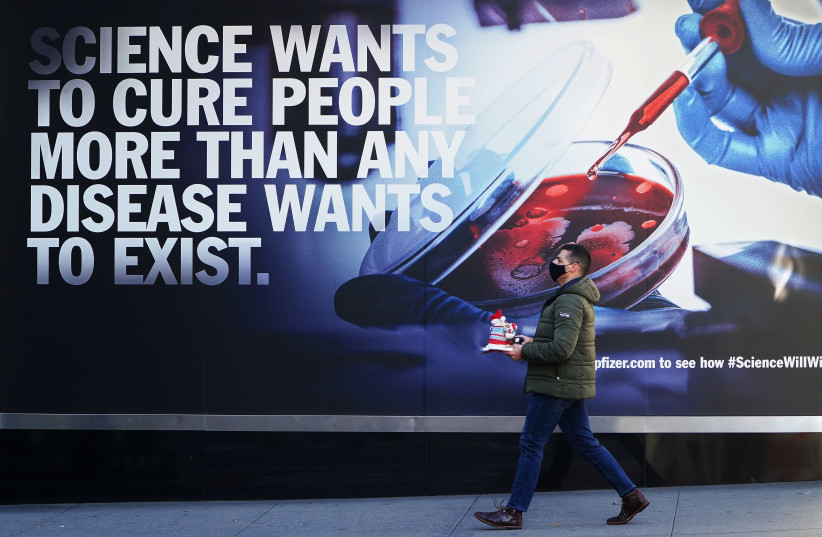One of the scientists behind the Pfizer-BioNTech vaccine – the first widely approved immunization for the new coronavirus – says the technology companies used could be applied to treat another deadly disease – cancer. Zlem Tureci co-founded the German company BioNTech alongside her husband in the late 2000s. BioNTech has, for years, been developing a way to fight cancer and eliminate tumors – technology they pushed to defeat the new coronavirus. The Pfizer-BioNTech vaccine, called BNT162b2, is based on messenger RNA (mRNA) technology, which uses a messenger chemical to instruct cells to produce proteins that mimic the outer surface of the new coronavirus, thereby creating immunity. MRNA depends on synthetic genes that can be generated and manufactured in weeks and produced at scale faster than conventional vaccines. The new technology was the first to be approved for a COVID-19 vaccine; Pfizer and BioNTech have already started collaborating to develop flu vaccines based on the mRNA technology they have incorporated into BNT162b2. The population of Israel is heavily dependent on the Pfizer-BioNTech vaccine and has administered at least one dose of COVID-19 mRNA to more than 5 million Israeli citizens. Tens of millions of other doses have been administered worldwide. “It is worth making bold decisions and trusting that if you have an extraordinary team, you will be able to solve any problems and obstacles that arise in real time,” Tureci told the Associated Press.
cnxps.cmd.push (function () {cnxps ({playerId: ’36af7c51-0caf-4741-9824-2c941fc6c17b’}). render (‘4c4d856e0e6f4e3d808bbc1715e132f6’);});
if (window.location.pathname.indexOf (“656089”)! = -1) {console.log (“hedva connatix”); document.getElementsByClassName (“divConnatix”)[0].style.display = “none”;}Although there was a clear air of hesitation about the vaccine – the reluctance or refusal to be vaccinated – among the world’s populations, Teluci noted to the AP that “no corners were cut” or stone unturned during the race to develop a vaccine. there is a rigid process and it doesn’t stop after the vaccine is approved, ”Teluci told the AP. “It is, in fact, continuing now throughout the world, where regulators have used reporting systems to track and evaluate any observations made with ours or other vaccines.” As Teluci noted, the success of COVID-19 mRNA-based vaccines is facilitating the use of the new technology not only in other vaccines, but possibly as treatments for cystic fibrosis, cancer and other difficult-to-treat diseases. Both vaccines used by Pfizer-BioNTech and Moderna depend on mRNA technology. they say that mRNA has the potential to target diseases that cannot be achieved by conventional drugs. The technology is often compared to a computer’s operating system, allowing drug makers to alter their target by inserting new genetic code into a fabricated form of mRNA, a natural messenger chemical that instructs the body to produce specific proteins. Its advantage in vaccines is versatility and speed compared to standard technology that requires long lead times to produce and purify proteins and creat. and a vaccine. More than 150 mRNA and therapeutic vaccines are in development globally, said the root analysis. Most are still in the first tests on animals, but more than 30 have reached the test on humans. MRNA can be very difficult to work with, making future treatment successes uncertain. Modern, for example, is working on treatments for heart disease, cancer and rare diseases. Its most advanced non-COVID program is a vaccine for cytomegalovirus, the leading cause of birth defects in the United States. Drew Weissman, professor of infectious diseases at the University of Pennsylvania Perelman School of Medicine, is one of two scientists who have been credited with the 2005 breakthrough discovery of how to alter the molecular structure of mRNA to keep it stable enough to pass through defenses of the body. In the past nine months, Weissman said that 20 companies working in the field of mRNA have invited him to join their boards of directors, and the number of labs asking to collaborate with Penn on mRNA work has almost tripled.
Reuters contributed to this report.
